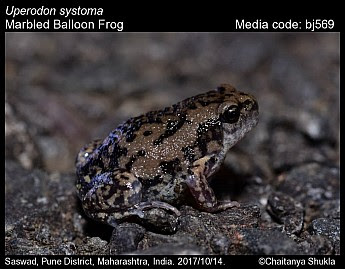 |
| This photo was taken at ACCC by Dr.Thanigaivel |
 |
| Early stage of Marbled Balloon Frog Adult stage of Marbled Balloon Frog |
Scientific name: Uperodon systoma
Common name: Indistinct frog, Marbled balloon frog, Lesser balloon frog.
Tamil name: பளிங்கு பலூன் தவளை
Distribution: India, Pakistan, Nepal, Srilanka, Bangladesh
 |
| Distribution of Marbled Ballon Frog |
Characteristic features:
- It is a fossorial species and moist soil is essential for this frog.
(A fossorial (from Latin Fossor 'digger') animal is one adapted to digging which lives primarily, but not solely, underground.)
- It is known to be an excellent burrower, quickly burrowing into loose moist soil with the help of its well-developed and powerful metatarsal tubercles.
- Scientists collected the specimen of this frog species at the depth of 1 - 1.5 metres.
- Scientists discovered that this frog species can able to live up to 13 months without food.
- During dry months the frog retreats into the moist environs of termite nests.
Main Diet: Termites and Ants
Body structure:
- The body of the frog is globular due to the enormously developed inflated lungs.
- It lacks teeth.
- It caught its prey using its tongue.
- The frog moves with small hops or slowly walks on the ground.
- It is a weak swimmer that usually floats in water.
Reproductive Behaviour:
- We can able to spot this frog easily in rainy seasons.
- The male frog will create a call for mating from the banks of the paddy fields, torrents and ponds.
- The call is like a bleating goat.
- The eggs are laid in masses which float on the surface of the water.
Breeding season: Monsoon rains
Reference:
Tags:
Amphibians


